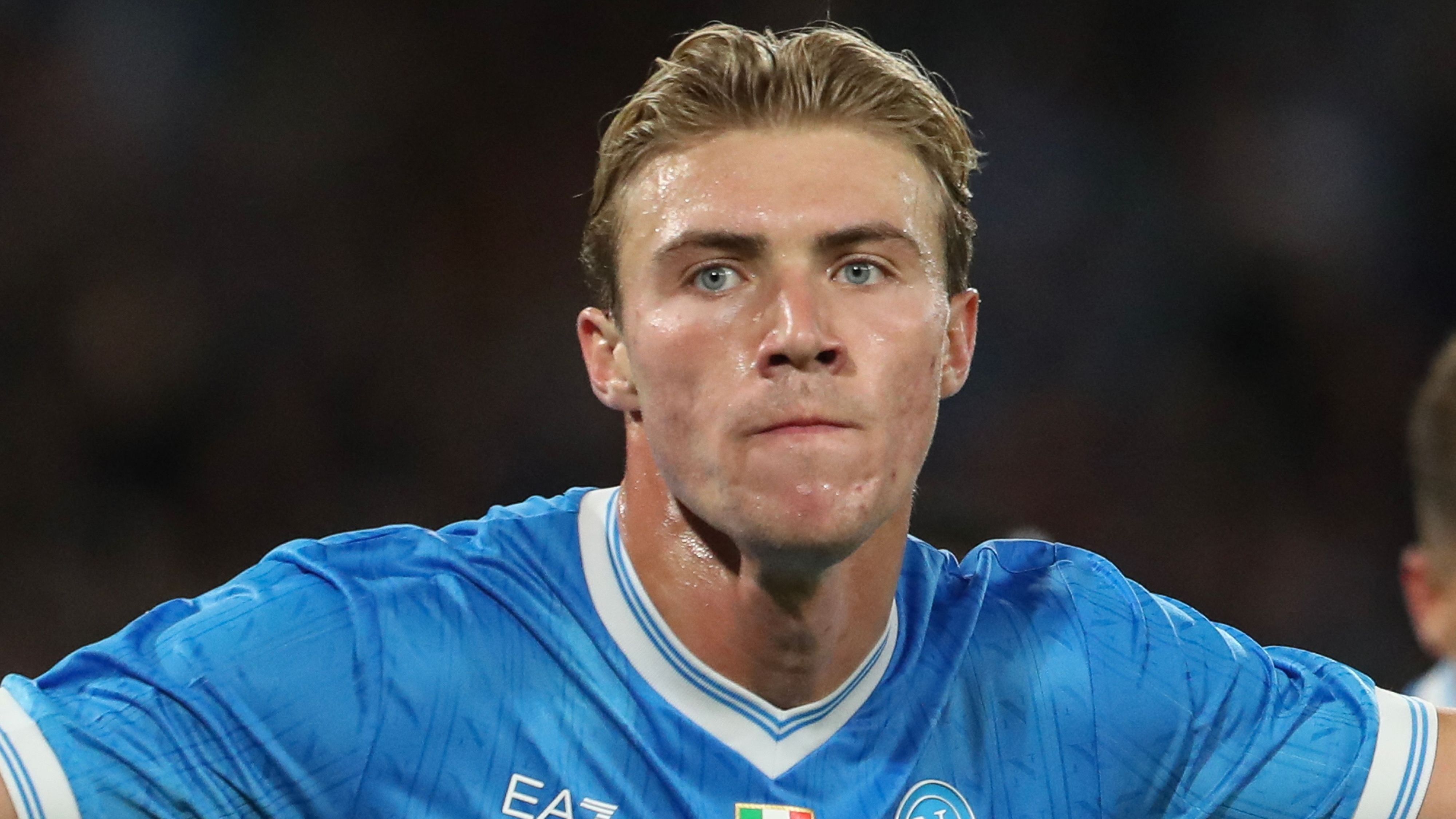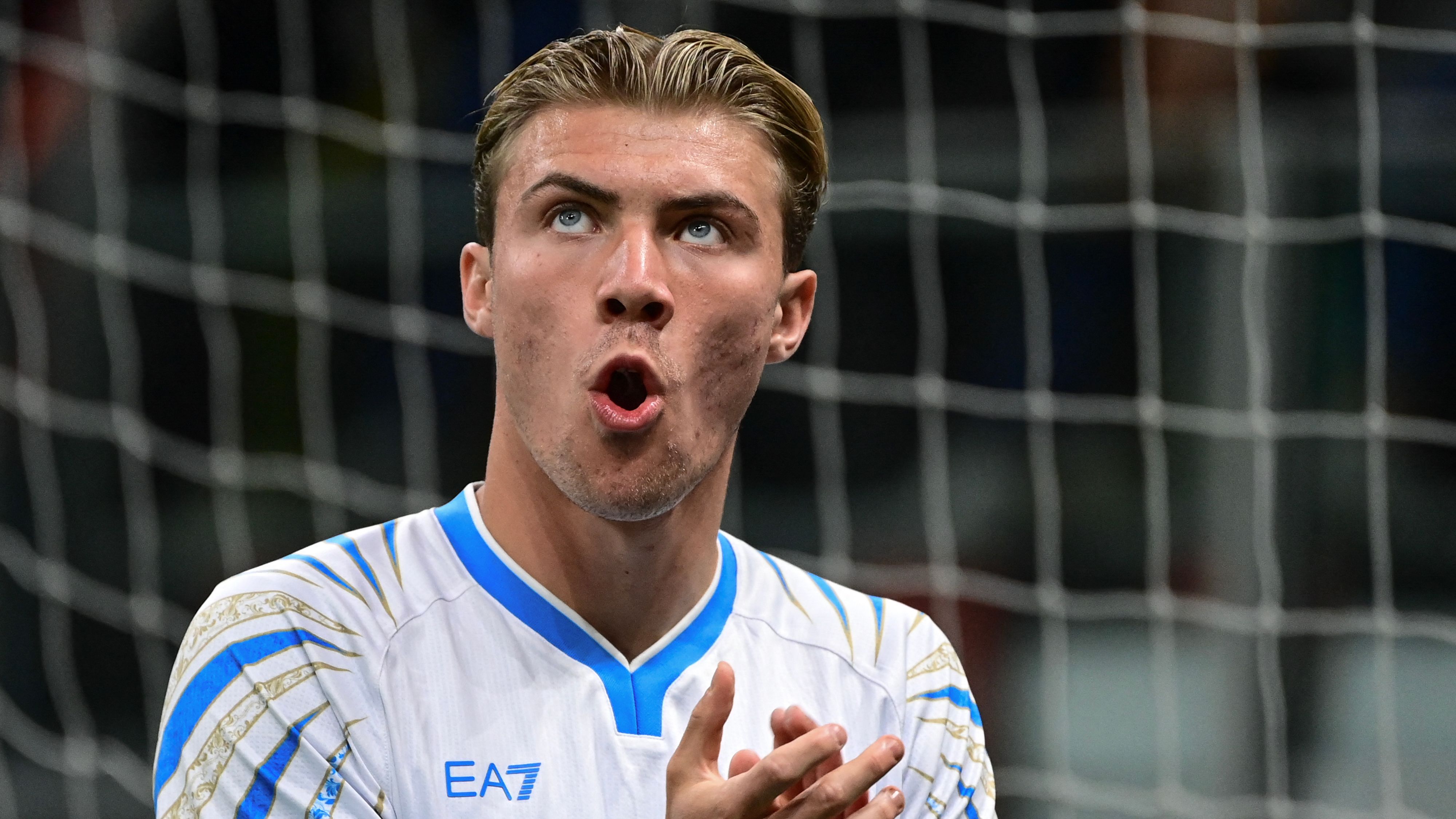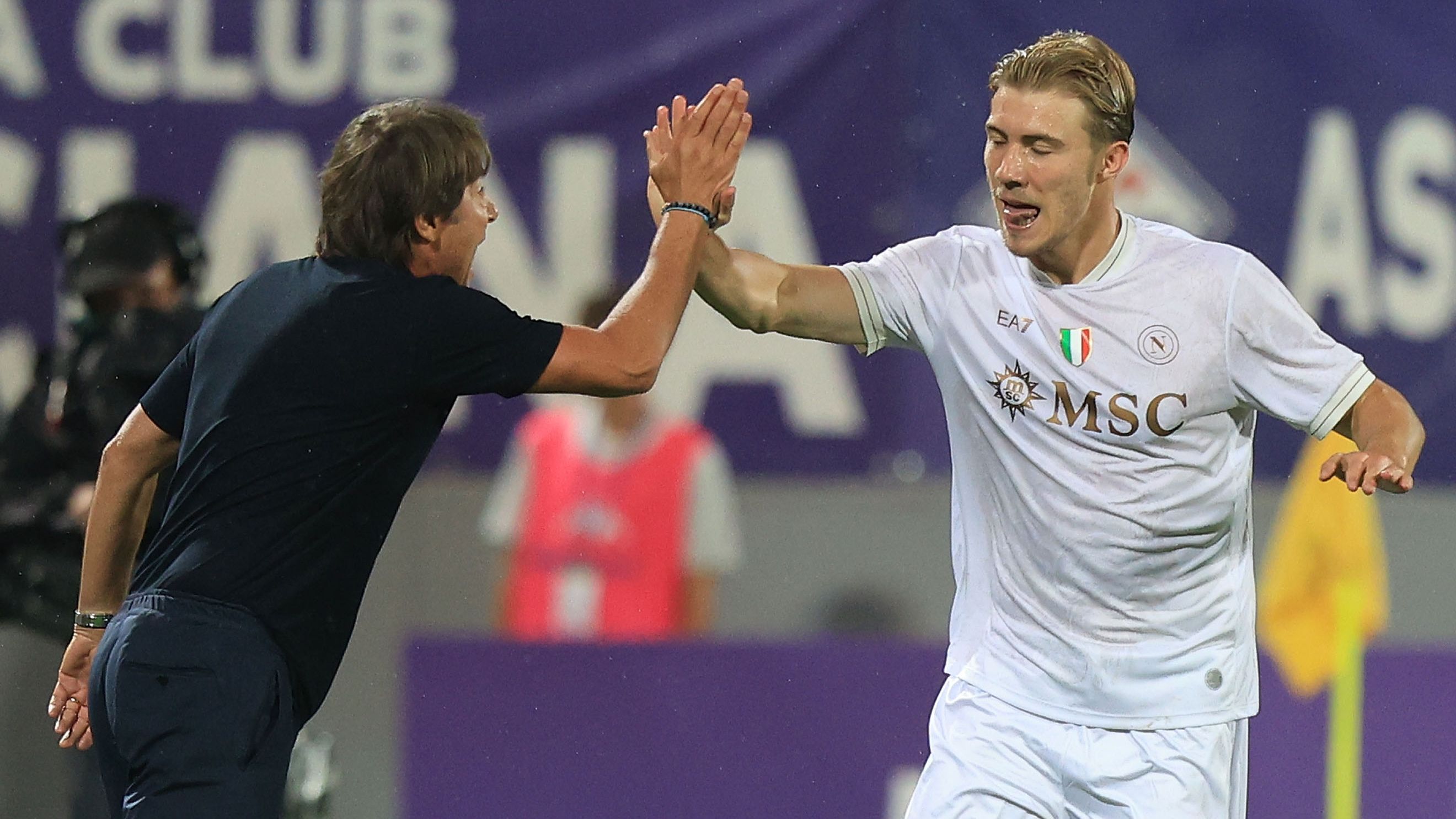


Rasmus Hojlund’s Triumphant Shift to Napoli Amid Manchester United Challenges
In the world of football, Rasmus Hojlund‘s story highlights how a change in environment can ignite a player’s career. The Danish forward, who joined Manchester United from Atalanta in 2023, faced hurdles in adapting to the Premier League despite the club’s substantial investment. Although he didn’t shine as a top goal-scorer in Italy, his potential convinced the English team to bring him on board just two years prior, yet his output remained limited, with only four goals in 32 outings during his last campaign there.
Rasmus Hojlund’s Transition and Rising Performance at Napoli
The addition of new talents like Bryan Mbeumo, Matheus Cunha, and Benjamin Sesko at Manchester United lowered Hojlund’s standing in the squad, leading the club to agree to his temporary move to Napoli, complete with a £38m buy option at the close of the 2025/26 season. Much like several others who have exited the Premier League giants recently, Hojlund has experienced a noticeable boost in his play since the switch.
Recent Achievements in Serie A
At just 22 years old, Hojlund has netted four goals in league play this year, including two in his initial four Serie A matches for Antonio Conte’s team. This strong start has helped Napoli maintain their position at the top of the standings after the first six fixtures of the campaign.
Insights from Denmark’s Coach on Hojlund’s Development
Ahead of Denmark’s victory against Belarus on Thursday, where Hojlund scored twice before halftime, national team coach Brian Riemer offered pointed remarks about his player’s situation. As reported in The Metro, Riemer stated: “I believe Rasmus possesses the skills for both leagues, no question about it. Does he thrive in Italian football? Absolutely, as he’s already shown. Yet that doesn’t imply he can’t succeed in English football-in fact, I’d argue the opposite.
“The key factor is that he’s now part of a cohesive unit where teammates focus on supporting one another, which greatly benefits a forward like Rasmus who relies on quality service. Ultimately, the league matters less than the team dynamics around him.”
Hojlund’s Personal Reflections on His Form
When discussing his recent surge in performance, Hojlund shared: “The main change has been joining an effective squad. I’ve seen plenty of action, and everything’s clicking. I’ve stayed in peak physical condition and took proactive steps during my off-season to prepare for this year.
“It’s rewarding to be in this groove. As a striker, my primary role is to find the net, and stepping onto the field with that confidence makes all the difference-I’m truly enjoying it.”
Napoli Coach’s Perspective on Hojlund’s Potential
Antonio Conte, the manager at Napoli, commented on the young striker: “We’re dealing with a 22-year-old who was underutilized at Manchester United. There’s plenty of growth ahead for him; he must keep pushing because his abilities could elevate him to stardom, and he’s already starting to demonstrate that.”
Patterns of Success After Leaving Manchester United
Hojlund isn’t alone in rediscovering his form post-United; the club has seen a decline in results lately, drawing mockery from the football community. Other players have similarly excelled elsewhere, such as Hojlund’s teammate at Napoli, Scott McTominay, who delivered outstanding performances that contributed to Napoli securing the Scudetto last season and earning him the Serie A MVP honor.
In similar veins, figures like Marcus Rashford made an impact during his short spell at Aston Villa, and Antony was instrumental in helping Real Betis reach the UEFA Conference League final last year, though they ultimately lost 4-1 to Chelsea in Poland.
What’s Next for Napoli
Looking ahead, Napoli aims to solidify their championship aspirations by visiting Turin to take on Torino on October 18th, while also keeping an eye on the clash between Roma and Inter as Serie A resumes after the international break.
The Backstory of Rasmus Hojlund’s Journey
Rasmus Hojlund, the young Danish striker, has been at the center of heated discussions in the football world, especially regarding how clubs handle emerging talents. His transfer from Manchester United to Napoli has highlighted potential issues in player development and support systems. Keywords like “Denmark coach criticism” and “Rasmus Hojlund treatment” have surged in searches as fans and analysts debate the impact of club decisions on a player’s career trajectory.
Early Career Highlights of Rasmus Hojlund
Before diving into the controversy, it’s worth noting Hojlund’s rapid rise in European football. The forward, known for his pace, finishing ability, and aerial prowess, burst onto the scene at clubs like Sturm Graz and then Atalanta before his high-profile move to Manchester United. Fans often search for “Rasmus Hojlund stats” to track his progress, which includes impressive goals in the Champions League and for the Danish national team.
Denmark Coach’s Strong Words on Manchester United’s Approach
Denmark’s national team coach, Kasper Hjulmand, didn’t hold back when addressing how Manchester United managed Hojlund during his tenure. Hjulmand publicly criticized the club for not providing the right environment for the young player to flourish, pointing to insufficient playing time and a lack of tactical fit as key issues. This “Denmark coach criticizes Manchester United” moment went viral, emphasizing the need for better “player treatment in football.”
Key Points of the Criticism
- Limited Opportunities: Hojlund often found himself on the bench or in roles that didn’t suit his strengths, which Hjulmand argued stunted his growth and confidence.
- Pressure and Expectations: As a high-priced signing, Hojlund faced immense scrutiny at Manchester United, a situation Hjulmand described as overwhelming for a 21-year-old.
- Lack of Support Structures: The coach highlighted the absence of personalized coaching and mental health resources, which are crucial for young players adapting to the Premier League.
This feedback from Hjulmand has sparked broader conversations around “football player management” and how clubs can better integrate new signings.
Hojlund’s Turnaround and Success at Napoli
Fast-forward to Hojlund’s time at Napoli, and the story takes a positive turn. The striker has been thriving in Serie A, scoring crucial goals and forming strong partnerships with teammates. Searches for “Rasmus Hojlund Napoli” have increased as he adapts seamlessly to the Italian style of play, which emphasizes quick transitions and creative freedom.
Factors Contributing to His Success
- Tactical Fit: Unlike at Manchester United, Napoli’s system allows Hojlund to play as a central forward, leveraging his speed and positioning.
- Regular Game Time: With consistent starts, he’s been able to build momentum, netting several goals in his initial matches.
- Supportive Environment: Napoli’s coaching staff has focused on his development, providing the mentorship that was reportedly missing earlier.
This shift underscores how the right club setup can transform a player’s performance, making “thriving at Napoli” a key phrase in discussions about Hojlund’s career.
Benefits of Proper Player Treatment in Football
When clubs prioritize player well-being and development, everyone wins-from the individual athlete to the team and fans. Effective management can lead to longer careers, better on-field results, and even financial gains through improved player value.
Advantages for Players and Clubs
- Enhanced Performance: Players like Hojlund benefit from tailored training, reducing injury risks and boosting confidence, which directly translates to better match outcomes.
- Mental Health Improvements: A supportive environment helps athletes cope with the pressures of professional sports, leading to sustained motivation and enjoyment.
- Long-Term Club Success: Teams that invest in young talents often see loyalty and growth, as seen in cases where players like Hojlund become club legends.
Case Studies of Similar Player Situations
Looking at football history, Hojlund’s experience isn’t unique. There are plenty of examples where a change of scenery revitalized a player’s career, offering valuable lessons for “Manchester United player treatment” critiques.
Notable Examples
- Erling Haaland’s Move to Borussia Dortmund: After struggling for minutes at RB Salzburg’s parent club, Haaland thrived with more opportunities, scoring prolifically and drawing comparisons to Hojlund’s Napoli stint.
- Mo Salah at Liverpool: Salah’s career took off after a tough spell at Chelsea, highlighting how the right tactical role can unlock potential, much like Hojlund’s current form.
- Jadon Sancho’s Struggles and Recovery: Similar to Hojlund, Sancho faced criticism at Manchester United before finding his feet elsewhere, emphasizing the need for adaptive management strategies.
These case studies show that timely interventions can prevent talent from going to waste.
Practical Tips for Managing Young Football Talents
For clubs and coaches aiming to avoid pitfalls like those seen with Hojlund at Manchester United, here are some actionable strategies. These tips can help optimize “Rasmus Hojlund-like situations” and foster better player development.
Step-by-Step Advice
- Assess Individual Needs: Start with thorough evaluations of a player’s style and mental state to ensure they fit the team’s tactics.
- Provide Gradual Exposure: Gradually increase playing time for young stars to build confidence without overwhelming them.
- Incorporate Mental Health Support: Work with sports psychologists to help players handle pressure, as Hjulmand suggested.
- Foster Open Communication: Regular check-ins between coaches, players, and agents can identify issues early, preventing public criticisms.
- Monitor Progress Holistically: Track not just stats but also off-field well-being to ensure comprehensive development.
By applying these tips, clubs can create environments where talents like Hojlund can excel from the start.
First-Hand Experiences from Football Insiders
Drawing from interviews and reports, many former players and coaches have shared insights into scenarios similar to Hojlund’s. For instance, ex-Manchester United players have discussed the intense demands of the club, noting that “player treatment at big clubs” often needs reevaluation. One anonymous source mentioned how better integration could have kept Hojlund happy, while Napoli’s manager has praised the striker’s adaptability, calling it a “refreshing change” from his previous setup. These accounts add a human element to the debate, making it clear that personal experiences shape how we view “Denmark coach’s critique of Manchester United.”









